Welcome back to This Week in Apps, the Extra Crunch series that recaps the latest OS news, the applications they support and the money that flows through it all.
The app industry is as hot as ever with a record 204 billion downloads in 2019 and $120 billion in consumer spending in 2019, according to App Annie’s recently released “State of Mobile” annual report. People are now spending 3 hours and 40 minutes per day using apps, rivaling TV. Apps aren’t just a way to pass idle hours — they’re a big business. In 2019, mobile-first companies had a combined $544 billion valuation, 6.5x higher than those without a mobile focus.
In this Extra Crunch series, we help you to keep up with the latest news from the world of apps, delivered on a weekly basis.
This week, we dig into App Annie’s new “State of Mobile 2019” report and other app trends. We’re also seeing big gains for TikTok in 2019 and Disney+ in Q4. Both Apple and Google announced acquisitions this week that have implications for the mobile industry, as well.
Headlines
State of Mobile 2019
App Annie’s anticipated “State of Mobile” report was released this week, offering insights into 2019’s app trends and statistics. Last year, apps stores worldwide saw a record 204 billion downloads, consumer spend of $120 billion and huge growth in emerging markets like India, Brazil, Indonesia, and China, where downloads were up 190%, 40%, 70%, and 80%, respectively, since 2016.
However, app downloads in the U.S. have slowed — the market only grew 5% during that same time. Games continue to generate the majority (72%) of app revenue, but subscription revenue has also played a big role. In 2019, subscriptions in non-gaming apps accounted for 28% of consumer spending, up from 18% in 2016. A full write-up of the report is here on TechCrunch, but the big takeaway is that the app industry is as hot as ever, even if much of the new growth is outside the U.S.
Related to this, App Annie also released a set of cool interactive charts that show how the mobile economy has changed over the past decade. When visualized this way, the differences between the market for apps and games becomes quite apparent.
Mobile games to top $100 Billion in 2020
App Annie’s report included a few forecasts for the year ahead, as well — like the huge milestone for mobile gaming, which is expected to surpass $100 billion this year across all app stores. In 2019, mobile games saw 25% more spend than all other gaming (PC, Mac, web, console), combined. Mobile gaming also extended its lead in consumer spend to 2.4x of PC/Mac gaming and 2.9x of consoles.
Google acquires no-code app development platform, AppSheet
Google this week announced it was acquiring the 8-year-old mobile app building platform, AppSheet, which had raised more than $17M to date at a $60M valuation. Deal terms weren’t shared. The startup had created a simple way for companies to build mobile apps without having to write a line of code, instead pulling data from a spreadsheet, database or form, then using the field or column names as the basis for building the app. The acquisition made sense, as it was already integrated with Google Cloud by way of its support for Google Sheets and Google Forms. The deal will give companies that wouldn’t otherwise have a way to create a mobile app a way to participate in the app economy. This could be particularly important for emerging markets where local app expertise isn’t as prevalent.
Disney+ was the most downloaded app in the U.S. in Q4 2019
U.S. consumers were so ready for Disney’s new streaming service. According to Q4 data from Sensor Tower, Disney+ was downloaded more than 30 million times in the U.S. in Q4 2019 — that’s more than double its next nearest competitor, TikTok. The App Store accounted for over 18 million of those downloads, with another 12 million coming from Google Play. On the App Store, Disney+ even booted YouTube from the No. 1 position it had held for the past four quarters. It also hit a notable milestone on Google Play, as no other app had surpassed 10 million in U.S. downloads on Google Play in a quarter since Facebook Messenger back in 2017.
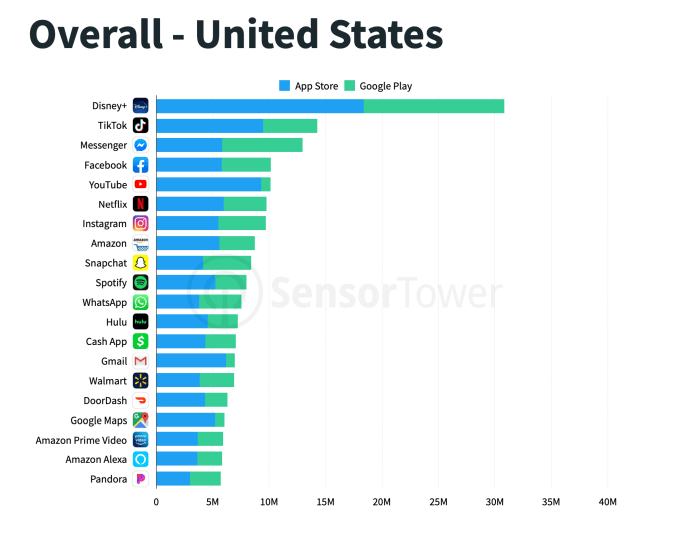
OCR provider Anyline raises $12M, heading to U.S.
Vienna-based Anyline, a provider of optical character recognition (OCR) technology that developers use to build OCR functions into their websites and apps, raised $12 million in Series A funding, TechCrunch reported this week. Its specialized OCR solutions can be used by businesses that want to scan and collect analog info, like identity documents, serial numbers and utility meters, for example. Clients include Canon, Porsche, E.On, national governments and the U.N.
iPhone can now be a physical security key with Google Smart Lock app
Google’s Smart Lock iOS app was updated this week to turn your iPhone into a physical security key when logging into Google’s first-party services through Chrome. Google had already allowed Android users to use their phones in this way, but bringing this support to iOS increased the security over using alternative 2FA methods like getting codes over SMS. The experience of using the app is similar to that of Google Prompt, which shares the same UI. The app requires that Bluetooth be enabled on both the phone and the desktop where you’re trying to log in.
Facebook now sends third-party login notifications
Speaking of security, a new Facebook feature will now alert you when your account is used to log in to a third-party app. This serves as an additional layer of protection in case your account has been compromised so you can take back control. The notification is sent both via email and in the Facebook app, and includes what kind of details Facebook shared, such as name, profile pic, email, birthday, friends list, or Likes. Facebook has been in recovery mode since its Cambridge Analytica scandal exposed the data of up to 87M Facebook users to the firm and led to increased scrutiny by regulators. A simple notification that alerted users to what data was being accessed and by what app could have averted such a crisis. It’s the sort of data protection mechanism that should have been built in from day one. If Facebook wasn’t making so much dang money off user data, it might have actually cared to build such a thing.
Study finds many popular apps are over-sharing your data
Facebook is not alone in being cavalier with user data. A study released this week and covered by Consumer Reports revealed how a number of popular apps, including Grindr, OKCupid, Happn, Tinder, period-trackers Clue and MyDays, Perfect365, kid’s game My Talking Tom 2, and many others are sharing personal data with companies in the advertising business. The report tries to make this sound like a revelation, but it’s unfortunately just how the ad-supported world of apps and the wider web has been designed. Users lost control of their data ages ago.
The collected data — which can include things like sexual orientation, birthday, political views GPS data, and ID numbers associated with individual smartphones — is used primarily for ad attribution and targeting (e.g. personalization). But consumers don’t really understand how any of this works nor are they able to give meaningful consent to this data-sharing. The recipients of the user data, some of which include names like MoPub, AppsFlyer, Fysical, Braze, and Receptiv, have their own privacy policies to govern their use of the collected data — and then they have partners, too. Hundreds of them.
The report suggests this adtech industry-led data-sharing practice could be in violation of European regulations (GDPR) and California’s new privacy law. The ACLU is already on this and has sent a letter to CA’s Attorney General.
Pinterest overtakes Snapchat in U.S. users
The teens may be on Snapchat, but the recipe-pinning moms now outnumber them. Okay, it’s not exactly an apples-to-apples comparison, but it’s one that analysts at eMarketer pointed out this week. The firm noted that Pinterest has surpassed Snapchat as the third-largest social network in the U.S. In 2018, Snapchat topped Pinterest with 75.8M U.S. users to Pinterest’s 75.5M. But in 2019, things shifted. Snapchat grew to 80.2 million U.S. users — less than Pinterest’s 82.4M. eMarketer says that gap will continue to grow over the next few years, forecasting 90.1M U.S. users for Pinterest by 2022 to Snapchat’s 86.1M.
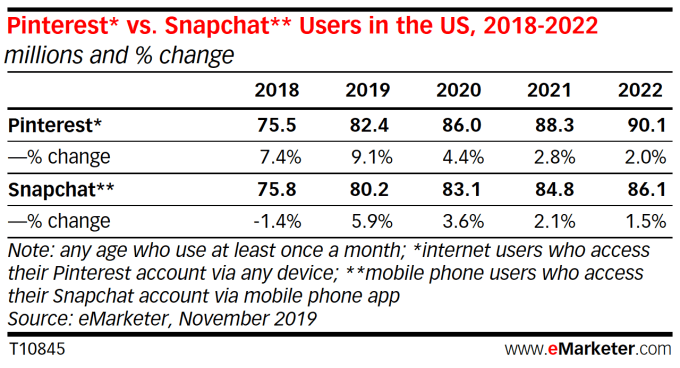
Android devices won’t alert to app updates anymore
A Google spokesperson confirmed to Android Police that all your missing app update notifications are a feature, not a bug. While users could mute app update alerts before, Google is now making this the default behavior. Its reasoning? Because most users consider these alerts an annoyance and just swipe them away. For end-users, this means if you want to see what’s been recently updated, you’ll need to open Play Store or turn off automatic updates.
Apple buys A.I. startup, Xnor.ai
Apple acquired the A.I. startup Xnor.ai for about $200 million, the company non-confirmed confirmed this week. The startup makes M.L. algorithms so efficient they can run on things like embedded electronics, for example. Apple didn’t reveal its intentions, of course, but it fits in with the company’s larger goal to shift M.L. tasks from the cloud to the device for privacy purposes.
25 Android apps with a combined 600M users were caught abusing subscriptions
This new type of financial fraud is known as “fleeceware” and involves the ability for apps to abuse trial periods and subscriptions by charging users for the subscription even when the user uninstalls the app. Sophos this week said it found 25 Android apps that were charging users even though their app had been deleted from the users’ phones. In addition, the fees they were charging were obscene — $100 to $240 per year for very simple apps like QR/barcode readers and calculators.
Android hasn’t been the only platform targeted by scammers. A number of basic utilities were once found charging iOS users for subscriptions by tricking them by way of confusing signup flows and other false promises.
The Information’s Crash Course in App Review
Subscription news site The Information wanted to launch an app and wasn’t happy about the app review process.
The company was told they couldn’t underline or overly emphasize “free trial” in their text, for starters. (Darn those subscription design guidelines!)
Apple also wanted the language about the trial period to be written clearly! How dare they?
The Information’s app was found to be charging money for stuff its website offered for free and they had to change that in order to submit the app. How rotten!
The app couldn’t ask for user emails because it didn’t offer personalized, account-based features. Stupid user privacy!
In all seriousness, the legitimate complaint here is that The Information wanted to sell their subscriptions outside the Apple ecosystem and doesn’t think the current experience for that is user-friendy. It’s not. Today, apps like Audible, Amazon Prime Video, Netflix and others have to vaguely inform users that purchase transactions have to take place outside the app or give in and sell through the app, for a revenue share. It’s a potential antitrust issue in some cases and not a unique complaint by any means.
But a lot of what The Information attributes to Apple being overly aggressive in terms of what it allows and prevents doesn’t have to do with the fact that The Information is skirting the App Store with its subscriptions — it’s just standard policy. Apple already had a number of subscription-based apps acting way too scammy and came up with a set of guidelines to ensure consumers clearly understood when they would be charged and how much they’d pay.
Quick Hits
- Get your betas: The holidays are over, so Apple got back to action by shipping new betas for iOS (13.3.1), iPadOS (13.3.1), watchOS (6.1.2), tvOS (13.3.1), macOS (10.15.3), and Xcode (11.3.1) this week.
- It’s big in…Malaysia: Popular game Mobile Legends: Bang Bang from Moonton topped $502.5M in lifetime gross revenue, Sensor Tower says, thanks to traction in SE Asia. Its biggest markets were Malaysia ($87.5M), Indonesia ($69.2M) and the U.S. ($64.1M)
- TikTok’s breakout year: 44% of TikTok’s all-time downloads — or 738+M of its total 1.65B installs — were in 2019 alone. Now it just needs to figure out how to make money.
- Stadia’s 2020 roadmap: 120+ games, 10 in H1 to be exclusives; wireless gameplay on web, Assistant functionality on web, also coming
- Fun with Apple revenue charts: You should see the last one
- Mobile gaming revenue:
Mobile Gaming distribution platforms:
1. App Store [$33bn] (50%)
2. Google Play [$18bn] (27%)
3. "China" [$13bn] (20%)
4. Other [$2bn] (3%)#HuaweiDeveloperDay pic.twitter.com/VAm0OOeeA7— Francisco Jeronimo (@fjeronimo) January 16, 2020
Downloads:
Copilot
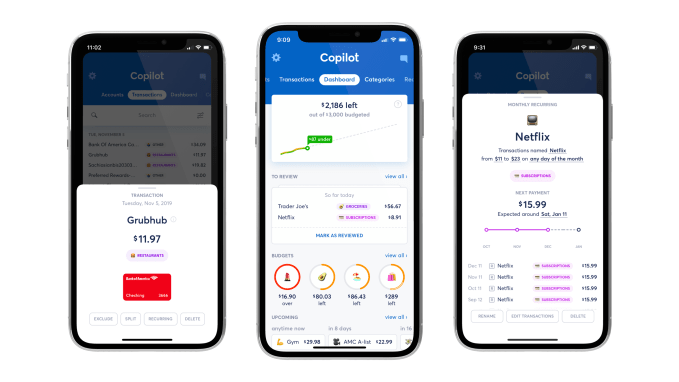
This new, would-be Mint killer aims to help users budget and eventually could help users manage investments and assets, too. Mint made money by recommending financial products. Copilot, however, goes the subscription route. $2.99/mo for now. It’s another example of a startup backed by Plaid, which sold to Visa this week for $3.5B.
Doublicat
This face-swapping app puts your face in a famous GIF.
First: every face-swapping app has racial implications, not just that one Snapchat filter. So this is generally a category of app to avoid. But nothing is going to stop newcomers from pushing forward to test the limits of face-swapping tech, it seems. And here comes the latest. Ukraine-based Doublicat this week launched an app that puts your face in all kinds of GIFs, including those from Friends, Star Wars, Game of Thrones, Silicon Valley and more…which I’m sure is totally licensed and legal. (??!!) The app calls itself a deepfake app for GIFs and uses its proprietary A.I., not 3D modeling to make its swaps. The end results are…bizarre and terrifying.
Tweet of the Week:
Question time dev Twitter! What inspired you to get into (iOS) development when you just started?
— Donny Wals 👾 (@DonnyWals) January 16, 2020
133 comments and growing on this fun thread.
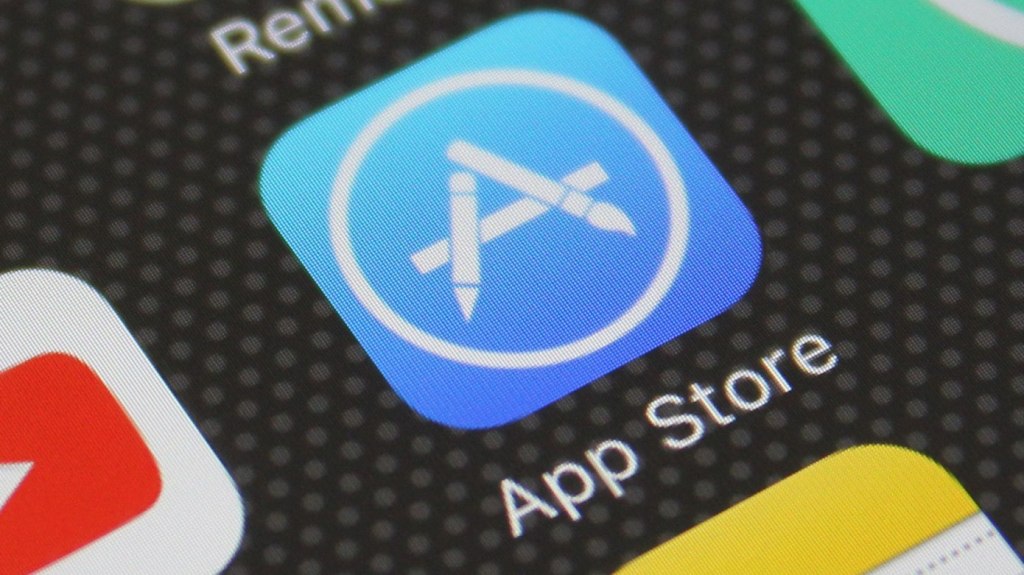


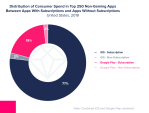
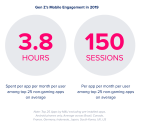
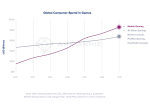































Comment